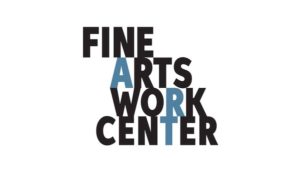PROVINCETOWN — The Fine Arts Work Center’s executive director has announced his resignation by June 2021 following charges of classism and racism by this year’s fellows and one staff member.
Executive Director Richard MacMillan, a former fundraising executive with M.I.T., announced to the nonprofit’s board of trustees on Aug. 25 that he will be stepping down, according to a prepared statement released by the board. No date other than “by June 2021” was specified for his departure.
“Within this timeframe, Richard will continue to oversee all of the initiatives he has been instrumental in developing to create a foundation for his successor and the FAWC will convene a search committee for an executive director who will work with him on a smooth transition,” the statement read.
 This follows a controversial year during which the 20 FAWC fellows publicly complained that their stipends were not sufficient. The group displayed a letter stating as much during their annual exhibition at the Provincetown Art Association and Museum in December. Then, as the winter fellowships came to a close during the pandemic, five fellows asked to stay on beyond the allotted seven months because, they said, they had no safe place to go.
This follows a controversial year during which the 20 FAWC fellows publicly complained that their stipends were not sufficient. The group displayed a letter stating as much during their annual exhibition at the Provincetown Art Association and Museum in December. Then, as the winter fellowships came to a close during the pandemic, five fellows asked to stay on beyond the allotted seven months because, they said, they had no safe place to go.
MacMillan and the board, none of whom would comment for this story, granted a stipend increase from $750 a month to $1,000. They also allowed the fellows to stay on an extra six weeks in the spring for free. But this did not satisfy the fellows, one of whom stayed on at the work center beyond the June 1 deadline for leaving, daring the FAWC to remove her when the governor had imposed a ban on evictions through October.
MacMillan told the Independent in June that he had no intention of forcing her to leave.
On June 8, the fellows sent out a “call for action” letter listing their grievances, and it garnered about 80 signatures from members of the arts community.
“The FAWC has failed to address concerns raised in recent years regarding racially-charged interactions at the FAWC and has engaged in behaviors and practices that silenced those voices,” the fellows’ letter stated.
FAWC’s visual coordinator, Lydia Hicks, resigned in the spring following what she described as racist behavior by some of the staff. Earlier in the winter, co-executive directive Bette Warner tendered her resignation, she said, for personal reasons.
In response to the fellows’ complaints, MacMillan and the board admitted, in a statement, that the work center has been “complicit with the structural racism that plagues the country.”
MacMillan joined FAWC in March 2019 after 11 years at M.I.T., where he was the senior director of philanthropic advising. Signe Swenson, a former colleague of MacMillan’s at M.I.T., told the Independent MacMillan was aware of and approved of the university accepting and concealing donations from the convicted sex offender Jeffrey Epstein. MacMillan has denied this.
FAWC is one of Provincetown’s most respected arts institutions. Former fellows have won 7 Pulitzer Prizes and nearly 50 Guggenheim Fellowships.
Last week, in its prepared statement, the FAWC board wrote that “throughout this time of great concern and crisis, Richard has provided stalwart leadership, encouraging a spirit of collaboration and professionalism between staff, trustees, fellows and donors.
“Our response to the call for action [has] been implemented under his leadership,” the board’s statement continued. This response includes creation of a council of fellows on the board of trustees to improve dialogue between fellows, staff, and the board, and creation of a diversity, equity, and inclusion committee, which is now “underway,” according to the statement.
FAWC has hired TDC, a Boston consulting group, to “set the course for the future,” it stated. The trustees also hired a “new financial and technical consultant” to plan for 2021.
Due to the pandemic, there will be no residency program for 2020-2021, according to Alix Ritchie, whose wife, Marty Davis, is president of the board of trustees.
MacMillan is also quoted in the trustee’s statement: “While my time at the Work Center has brought unexpected challenges and tested many of us, I want you to know how grateful I am to have this opportunity to push forward for stabilization and to depart with a sense that there is a clear pathway forward.”



